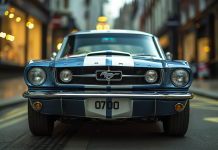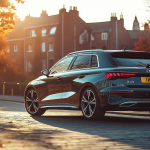Peugeot 208 petrol and diesel first drive review
Tuesday, 3 July 2012 10:33 AM

The new Peugeot 208 supermini strikes a striking pose in Rose Quartz metallic paint
When Peugeot announce an all-new small car, nippy hatchback fans in the UK generally cock an interested ear. We’re not going to bang on about Peugeot’s rich history of small-car-success, but it’s fair to say that they’ve hit the nippy-nail squarely on the head with some of their previous hatches; hot or not.
So, here’s their all-new 208 supermini; the car that replaces the 207 – that’s still shifting some units, by the way – and Peugeot expect big things from this highly-styled new car; it’s their small hatchback regenerator.
But, there’s substance too, with all of the brand’s latest low-emissions tech going under the sculpted hood – all diesel engines, for example, are under 100g/km for CO2 – as well as a lightweight bodyshell and large interior touchscreen infotainment in most of the cars sold. The Ford Fiesta and Vauxhall Corsa – both top-selling superminis – are the target for 208, and at a starting price of £ 9,995, it’s right in the competition’s price ballpark.
I tried out a 5-door 208 with a new 3-cylinder, 1.2-litre, 82bhp petrol engine; rated at 104g/km of CO2 (that Peugeot expect to be a hit with private customers), in Active trim, priced at £12,795.
I also sampled an Allure-trimmed 5-door 208 with a 1.6 e-HDi diesel engine that’s good for 92bhp and ducks under the road-taxing 100g/km CO2 target at 98g/km. The petrol 208 is quoted at 62.8mpg on the combined economy cycle, while the diesel is said to hit 74.3mpg.
Peugeot 208 first drive review
First impressions:
Taste is a personal thing, of course, but there is much exterior styling to take with the new Peugeot 208. It’s smaller on the outside than the 207 it takes over from, and when you look at it in the metal for the first time, its smaller package could raise an eyebrow. But Peugeot have maximised the interior space, and a smaller car is a lighter car and a lighter car goes further on its fuel.
While the 208 looks compact – almost city car-small – it is, in my opinion, very nicely proportioned and doesn’t suffer from the size-over-style limitations that a true city car can.
The front-end is a feast of styling details, curves, vents and grilles, with the headlights looking bang-up-to-date for style and substance – with LEDs, of course – and its short bonnet gives it a stout and substantial look.
There is surfacing detailing all over the new 208; on the bonnet and down the sides, and again, the taillights are highly detailed and sculpted. It’ll take you a while to run out of details to find and look at on the 208, and I challenge anyone to call it bland. Indeed, I feel that the details come together very pleasantly and without fuss – a mature and modern design, if you will.
Into the interior:
With a starting price of £9,995, and with out test cars ranging from £12,795 (Allure trim petrol) to £15,845 (Active trim diesel), we’d be right to expect some interior treats from these more expensive tester 208s, and from a basic design point of view, it’s an interior that matches the exterior for funky flavour.
Some of the plastics weren’t the prettiest but these were generally more tucked away than the higher quality interior finishes that more regularly met my eye or touch, and Peugeot have used a variety of quality-looking trims throughout the important parts of the cabin.
The 7-inch colour touchscreen looks rather large in this small car, because it is, and the bigger the screen the easier it is to operate with a finger on the screen. Even those with chunkier digits should prod around with ease. It is, however, an in-depth system that controls most of the passengers’ wants and need, and while it’s clearly of the latest graphic design and functionality, there's a lot going on to learn.
I found a good – if perhaps not Fiesta-beating driving position in 208 test cars – and at 6’ 4” I found a respectable level of air and space around me. Some have noted that the smaller steering wheel found in the 208 obscured some of the (handsome) dashboard dials, but my height meant I looked down on an unobstructed clocks pod. Your own test drive will see if it suits you. The small steering wheel adds a dash of extra nippy to the steering interaction, too.
The petrol drive:
Small capacity petrol engines are already well used in the small car market; the high-selling Peugeot 107 city car puts its 3-cylinder 1-litre engine to very good use, but this 1.2-litre, 3-cylinder motor is newer, bigger and more powerful than the happy-go-lucky little motor in the 107.
Peugeot quote combined economy and CO2 for this engine in this car at 62.8mpg and 104g/km, respectively. Good numbers indeed, but not quite enough to duck road tax (£20 per year from the second year) or the London congestion charge.
With 82bhp, the 3-cylinder engine is obviously no heavyweight (0-62mph in 14secs); the plan is to work with the eco-focused engine and stretch the fuel out. With this type of driving I think the new engine will work well, but, like other small-cc engines, if you get a bit fancy with your right foot the economy will suffer. A little engine that has to work hard to make the power will have to be revved hard, and high revs use more fuel.
A turbocharger would’ve helped with the low-revs torque here; negating the need for higher revs to make the power, but Peugeot chose not to use forced induction. I expect their development engineers worked out that non-turbo was the way to go for best economy. A longer test drive will reveal more on this.
Driven gently around town, to maximise efficiency, and the petrol-powered 208 makes a decent case for itself. Visibility is good and its smaller stature certainly feels nippy, and it’s quick to respond. I wasn’t totally convinced by the suspension, however, as it didn’t seem to ride some of the more damaged road surfaces so well; a little on the hard side. But, again, a longer test drive than the hour or two we had will reveal more.
The foot controls, gearbox and steering are all very light to operate, which will make stop-start town driving less tiring, and the brakes are from the usual Peugeot powerhouse.
The diesel drive:
This diesel engine does enjoy a turbocharger, however, and gets some useful low-down torque from it.
The 1.6-litre, e-HDi unit is a tried and tested performer in the Peugeot range and comes with stop / start tech to kill the motor when it’s not needed. From my own general Peugeot experience and in a car as light as the 208 – over 100kg lighter than the 207 – I think the quoted combined economy of 74.3mpg is very close to achievable, and with 230Nm of torque, this diesel motor is more than capable of nipping this 208 around town. It’s quicker than the petrol, too, hitting 62mph in 12.2ses.
There is more weight to a diesel engine than a petrol engine – a heavier block to cope with the higher compression of the diesel fuel – and as such, the petrol-powered 208 felt lighter on its toes than the diesel, although this diesel engine with its early torque is, initially at least, easier to drive in a low-revs frugal manner.
At 98g/km, the 1.6 e-HDi motor will duck the congestion charge and there’ll be not a sniff of road tax, either. And that’s all very attractive in these troubled times.
Like the petrol 208, I’ll need more time to develop my feelings on the car’s ride. It’s not bad, but I’m wondering if it could be better. Much like styling, ride is a personal feeling – I like my cars rock hard and flat thorough the bends – but that’s not for the mass market. I’m not, at the moment, convinced that the 208’s ride is plush enough.
Ten second sum up:
The new Peugeot 208 certainly brings attractive styling and detail to the supermini segment, and its compact packaging should offer extra ease in town. The interior is modern and spacious, although there could be a question for some over the steering wheel placement. In all, a strong and bold step forward in terms of styling and packaging, I think, and with a good choice of frugal engines, too. But perhaps not a game-changer as an entire package.
Prices and availability:
The Peugeot 208 range starts at £9,995 (3-door). Prices as tested, £12,795 for the Active 1.2 VTi 82 (petrol), and £15,845 for the Allure 1.6 e-HDi 92 (diesel). Available now.










By Daniel Anslow
Follow us @TotallyMotor


































